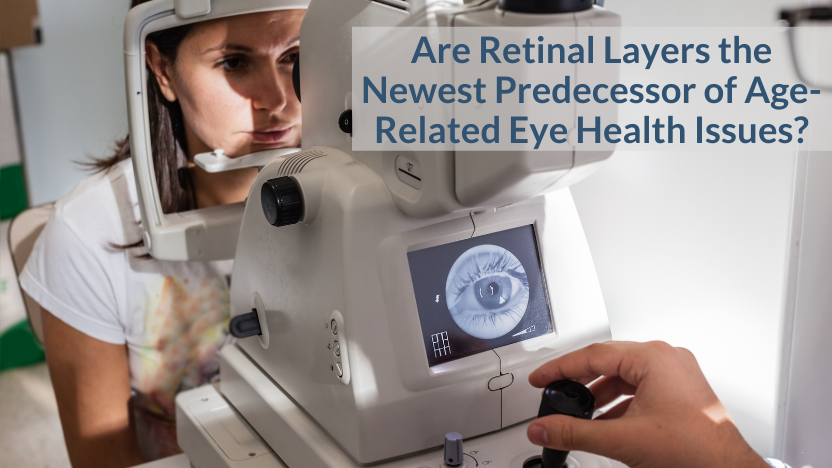Retinal Layers May Indicate Future Age-Related Eye Health Issues
Posted by EyePromise on Feb 24th 2022
As the population continues to age, age-related eye health issues are becoming increasingly common among patients. Because there’s no cure, early detection and intervention are key to preserving quality of life and vision. New research discovered a new way of potentially identifying patients at risk for age-related eye health issues: retinal layers.
The Study

The title of the study is Photoreceptor layer thinning is an early biomarker for age-related macular degeneration development: Epidemiological and genetic evidence from UK Biobank optical coherence tomography data. Age-related eye health issues are characterized by the outer retina thinning and the appearance of drusen, which lead to the Bruch’s membrane (BM) thickening and retinal pigment epithelium (RPE) complex. However, the timing between these events and the role that genetics play is unclear.
This study was intended to determine whether the retinal thinning precedes the RPE-BM complex and offers eye care professionals an additional method of identifying age-related eye health issues before development.
The Research Process
Researchers analyzed optical coherence tomography (OCT), electronic health record, and genomic data of 44,823 individuals. Participants’ ages ranged from 40 to 70 years old, with 54% being female. The average follow-up was 10 years to distinguish the connection between the timing of retinal layer thickness in age-related eye health issues and how epidemiological and genetic factors affect it.
The Results of the Recent Retinal Layer Study
The research authors discovered that retinal layer thinning does indeed precede RPE-Bruch’s membrane thickening and indicate future development of age-related eye health issues. In fact, this epidemiology occurs decades before! Retinal layer thinning occurred throughout the lifespan of participants, while RPE-BM complex usually started after age 57.
Additionally, the research found that genetic variants that increase the risk of age-related eye health issues were significantly associated with the thinning of retinal layers. Researchers stated:
“These findings support a potential causal influence of [age-related eye health] genetic variants on [retinal layer] thinning and suggest the clinical use of [retinal layer] thinning as an early-stage biomarker for risk of future age-related eye health issues.”
The Solution
While this data is great, it doesn’t offer a solution for when you’ve identified the patients at risk for developing age-related eye health issues. Luckily, EyePromise does! EyePromise Restore is a science-based eye health nutraceutical specifically formulated to proactively support eye health in aging patients. With high levels of dietary zeaxanthin and lutein, Omega-3s, B vitamins, and CoQ10, EyePromise Restore is the best recommendation for addressing risk factors of age-related eye health issues.
Once a patient has age-related eye health issues, there’s no going back. To offer patients the best outcome, early identification and intervention are key. With this new research, you can identify patients who are at risk before signs of age-related eye health issues surface. With EyePromise Restore, you can help these patients do something about their risk.


